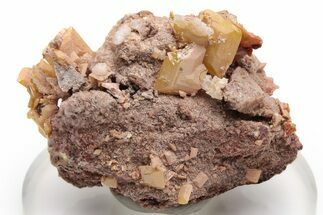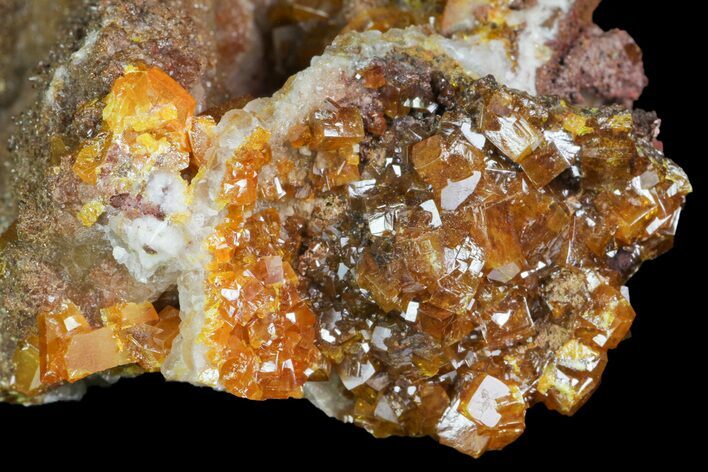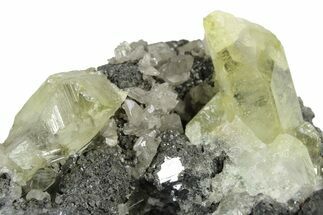This Specimen has been sold.
2.6" Lustrous Wulfenite Crystals on Calcite - Los Lamentos, Mexico
This specimen contains lustrous orange, tabular wulfenite crystals on a calcite encrusted matrix. It was collected from the Los Lamentos Mountains of Chihuahua, Mexico and measures 2.6 x 1.9".
It comes with an acrylic display stand.
It comes with an acrylic display stand.
About Wulfenite
Wulfenite is a lead-based molybdate mineral with a chemical formula Pb(MoO4). It forms as a secondary mineral in the oxidation zones of hydrothermal lead deposits, its color ranging anywhere between yellow to bright orange and red and occasionally brown. Typically forming as tabular, stubby, or pyramidal crystals, this unique mineral can be both brilliantly transparent and opaque.
Safety: While these crystals are safe to hold, due to the fact that they are lead-based we strongly recommend washing your hands after handling.
Wulfenite is a lead-based molybdate mineral with a chemical formula Pb(MoO4). It forms as a secondary mineral in the oxidation zones of hydrothermal lead deposits, its color ranging anywhere between yellow to bright orange and red and occasionally brown. Typically forming as tabular, stubby, or pyramidal crystals, this unique mineral can be both brilliantly transparent and opaque.
Safety: While these crystals are safe to hold, due to the fact that they are lead-based we strongly recommend washing your hands after handling.
About Calcite Crystals
Calcite crystals are a form of calcium carbonate (CaCO₃) known for their diverse shapes, transparency, and vibrant range of colors. They typically form in rhombohedral, scalenohedral, or prismatic shapes, often with well-defined, sharp edges and glossy surfaces. Calcite crystals are often translucent or transparent, sometimes displaying a double refraction effect where objects viewed through the crystal appear doubled. They can appear in various colors—white, clear, yellow, pink, blue, green, and orange—depending on impurities or trace minerals.
A notable characteristic of calcite is its reaction with weak acids like vinegar, which causes it to effervesce, or fizz, as it releases carbon dioxide. This property makes calcite crystals a key tool in geological identification and studies. Calcite forms in many environments, from sedimentary rocks like limestone and marble to hydrothermal veins.
Calcite crystals are a form of calcium carbonate (CaCO₃) known for their diverse shapes, transparency, and vibrant range of colors. They typically form in rhombohedral, scalenohedral, or prismatic shapes, often with well-defined, sharp edges and glossy surfaces. Calcite crystals are often translucent or transparent, sometimes displaying a double refraction effect where objects viewed through the crystal appear doubled. They can appear in various colors—white, clear, yellow, pink, blue, green, and orange—depending on impurities or trace minerals.
A notable characteristic of calcite is its reaction with weak acids like vinegar, which causes it to effervesce, or fizz, as it releases carbon dioxide. This property makes calcite crystals a key tool in geological identification and studies. Calcite forms in many environments, from sedimentary rocks like limestone and marble to hydrothermal veins.
SPECIES
Wulfenite & Calcite
LOCATION
Los Lamentos Mountains, Chihuahua, Mexico
SIZE
2.6 x 1.9"
CATEGORY
ITEM
#139791
 Reviews
Reviews














